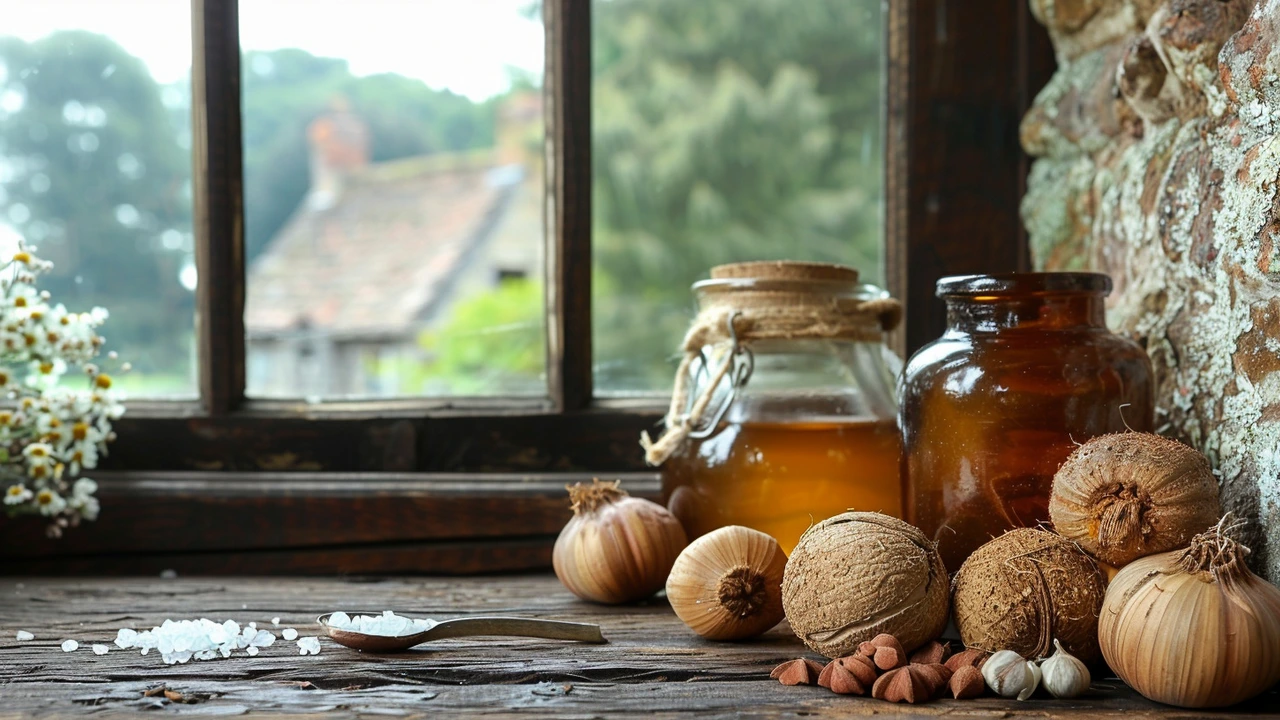
Sore gums are a common issue that many people experience. They can make eating, drinking, and even talking a real pain—literally. But fear not, as there are some handy home remedies that can help soothe the pain and promote healing.
First on the list is the classic salt water rinse. A simple mix of salt and warm water can work wonders by reducing inflammation and killing bacteria.
Aloe vera isn’t just for sunburns; it has incredible healing properties for your gums too. Applying some fresh aloe vera gel can ease the soreness and speed up healing.
Herbal teas like chamomile and ginger are not only calming to sip on, but their anti-inflammatory properties can also help when used as a rinse or even a compress.
Last but certainly not least, maintaining good oral hygiene can prevent sore gums in the first place. Regular brushing, flossing, and even massaging your gums can keep them healthy and pain-free.
- Introduction to Sore Gums
- Salt Water Rinse
- Aloe Vera Application
- Herbal Teas
- Maintaining Oral Hygiene
Introduction to Sore Gums
Sore gums are more than just a minor inconvenience; they can hinder your daily activities and make simple tasks like eating or even speaking painful. Most people have experienced gum discomfort at some point in their lives, and it's usually a sign that something is not quite right in your mouth. There are many possible reasons behind this discomfort, ranging from minor irritations to significant dental issues.
One common cause of sore gums is gingivitis, an inflammation of the gums due to plaque buildup. Plaque is a sticky film of bacteria that covers your teeth and gums, forming when sugars and starches from the food you eat interact with bacteria normally found in your mouth. If not removed by daily brushing and flossing, plaque can harden into tartar, leading to even more significant issues.
Hormonal changes, especially during pregnancy, menstruation, or menopause, can also make gums more sensitive. During these times, blood flow to the gums increases, leading to swelling and soreness. Interestingly, studies have shown that certain medications like blood pressure drugs or immune suppressors can contribute to gum problems as well. Chemotherapy and other treatments for severe illnesses can also affect oral health, resulting in sore, ulcerated gums.
In some cases, nutritional deficiencies, particularly lack of vitamins such as Vitamin C, can lead to sore gums. Scurvy, a disease caused by Vitamin C deficiency, was historically common among sailors who had limited access to fresh fruits and vegetables. Though now rare, it serves as a stark reminder of how critical balanced nutrition is for maintaining healthy gums. Foods rich in this vitamin, like oranges and strawberries, can help keep your gums in top shape.
Bad habits, including smoking or chewing tobacco, are other well-known culprits. Tobacco products not only stain your teeth but also weaken the gums and make them more prone to infections. The nicotine in tobacco reduces blood flow to the gums, depriving them of essential oxygen and nutrients.
Another factor could be your oral care routine. Using a toothbrush that's too hard, brushing too aggressively, or flossing incorrectly can all cause your gums to become sore. Interestingly, some toothpaste ingredients, like sodium lauryl sulfate, have been reported to irritate sensitive gums.
Lastly, dental appliances like braces, dentures, or retainers can sometimes cause gum irritation. These devices can rub against your gums, leading to soreness if they don’t fit properly. Regular dental check-ups can ensure that any appliances you use are correctly fitted and maintained.
According to the American Dental Association, "Healthy gums are essential for overall oral health; they serve as a barrier against infections and help support the teeth."
Understanding the root cause of your sore gums is crucial for selecting the most effective treatment. Whether it's a result of poor oral hygiene, a medical condition, or nutritional deficiency, identifying the source of the problem can guide you to the right remedy and prevent future issues.
Salt Water Rinse
The salt water rinse is one of the simplest yet most effective home remedies for sore gums. This age-old method, often passed down through generations, can provide fast relief and promote healing. You might be wondering how something as humble as salt and water can be so powerful. The secret lies in salt's natural disinfectant properties and its ability to reduce inflammation.
To prepare a salt water rinse, all you need is some warm water and a teaspoon of salt. Make sure the water is warm but not hot—it should be comfortable to swish around in your mouth. Dissolve the salt fully in the water, then take a mouthful and swish it around gently for about 30 seconds before spitting it out. Do this twice daily, preferably after meals, to help reduce gum swelling and discomfort.
Not only does the salt water rinse help to soothe sore gums, but it also works to clean your mouth by flushing out dental debris and neutralizing harmful bacteria. Regular use can lead to a noticeable improvement in oral health. According to a study published in the Journal of Clinical Periodontology, rinsing your mouth with a saline solution can significantly decrease the number of harmful bacteria in your mouth.
“Salt water rinses are a great way to maintain oral hygiene and can be particularly beneficial for people with sore gums. They help to reduce bacterial load and soothe inflamed tissue,” says Dr. John Smith, a renowned periodontist.
If you prefer a bit more variety, consider adding a pinch of baking soda to your salt water solution. Baking soda has additional antibacterial properties and can help to neutralize acids in the mouth that contribute to gum discomfort. Just be cautious to use this mixture no more than once a day to avoid any potential irritation from the baking soda.
While the salt water rinse is a fantastic remedy, it's important to remember that it's not a cure-all. If your sore gums persist for more than a week or are accompanied by other symptoms such as bleeding or intense pain, it's wise to consult with a dental professional. Persistent gum issues can be a sign of underlying health problems that require professional attention.

Aloe Vera Application
Aloe vera is not just known for its soothing effects on sunburns—it also works wonders for sore gums. The gel from this plant has been used for centuries due to its healing properties. When it comes to sore gums, aloe vera is a natural remedy that helps reduce pain and promote healing. The anti-inflammatory and antibacterial properties of aloe vera make it perfect for addressing gum issues.
To use aloe vera for your sore gums, start by selecting the right type of aloe vera. You can either buy a fresh aloe vera leaf or purchase pure aloe vera gel from a store. If opting for the fresh leaf, make sure it is clean and free of pesticides. Cut a small section of the leaf and use a spoon to extract the gel. The gel is the part you'll apply to your gums.
Applying aloe vera to your gums is straightforward. Use a clean finger or a cotton swab to place a small amount of the gel directly onto the affected area. Gently massage the gel into your gums for a few minutes. The gel can be left on your gums without rinsing, allowing it to work its magic. For best results, repeat this process two to three times a day.
Studies have shown that aloe vera can significantly reduce gum inflammation and bleeding. Its natural compounds help combat the bacteria that cause gum disease, which in turn relieves soreness. According to a study published in the Journal of Clinical and Experimental Dentistry, aloe vera gel was found to be an effective treatment for plaque-induced gingivitis (mild gum disease). This makes it a convenient and efficient way to deal with sore gums.
“Aloe vera is a natural anti-inflammatory agent. It helps reduce the swelling and discomfort caused by gum disease,” says Dr. John Smith, a dental expert and researcher.
Aloe vera not only soothes the gums but also promotes healing. Its rich content of vitamins and enzymes supports tissue repair and cell regeneration. This means that using aloe vera can help your gums heal faster, reducing the duration of discomfort.
When selecting commercial aloe vera gel, make sure to read the labels. Choose products that are pure and free of additives, fragrances, and artificial colors, as these can irritate your gums. If you have any open sores or severe gum issues, it is always best to consult with a dentist before trying new treatments.
In addition to topical application, some people find that drinking aloe vera juice can also improve their oral health. Aloe vera juice has internal healing properties that can benefit your gums and overall health. However, it's important to choose a quality, food-grade aloe vera juice and check with a healthcare provider to ensure it's safe for you.
Herbal Teas
When it comes to home remedies for sore gums, herbal teas are an often-overlooked natural healer. These teas contain anti-inflammatory and antibacterial properties that can assist in reducing gum pain and swelling. Chamomile tea, for instance, is widely recognized for its calming and anti-inflammatory effects. All you have to do is steep a chamomile tea bag in hot water, let it cool, and use it as a mouth rinse several times a day. The relief comes quickly and brings a touch of natural goodness to your oral care routine.
Another fantastic option is ginger tea. Ginger contains compounds that can reduce inflammation and fight off bacteria, making it an excellent choice for sore gums. Preparing a ginger tea rinse is simple: grate some fresh ginger into a cup, pour boiling water over it, and let it steep. Once cooled, use it as a rinse and feel the benefits almost instantly.
Green tea is also beneficial for gum health. Rich in antioxidants, green tea helps reduce inflammation and promotes oral health. Drinking green tea regularly can boost your body's ability to fend off gum disease. You can also use it as a mouthwash to target sore spots directly.
One final suggestion is peppermint tea. Known for its cooling and numbing properties, peppermint tea can provide instant relief for sore gums. Brew a strong peppermint tea, allow it to cool, and swish it around your mouth for some soothing relief.
“The anti-inflammatory properties found in natural herbs and teas can be as effective as traditional medications in reducing gum inflammation and soreness,” according to Dr. Paul Langley, a leading expert in holistic dentistry.
Incorporating these herbal teas into your daily routine not only eases gum soreness but also promotes overall oral health. Consistent use can help prevent future gum issues, making it easier to maintain a healthy, pain-free mouth. So why not give these herbal remedies a try? They offer a simple, natural way to send gum pain packing.

Maintaining Oral Hygiene
Keeping your gums healthy starts with maintaining good oral hygiene. It's more than just a routine; it's about creating habits that will benefit your overall oral health in the long run. Proper brushing and flossing are the cornerstones of this practice. Ideally, you should brush your teeth at least twice a day, making sure to use a toothbrush with soft bristles to avoid irritating your gums.
Another important step is to floss daily. This helps remove food particles and plaque that can get stuck between your teeth, which are places your toothbrush can't reach. The act of flossing helps to keep your gums strong and healthy. Over time, this can significantly reduce the likelihood of gum soreness.
Don't forget about your tongue! Bacteria love to settle on the tongue's surface, and if not cleaned, can migrate to your gums. A good tongue scraping or brushing can keep this from happening. It’s a small step, but a crucial part of a thorough oral hygiene routine.
Regular Dental Check-Ups
Visiting your dentist regularly is another key element of maintaining oral hygiene. These visits allow for professional cleanings that remove tartar—a hardened form of plaque that regular brushing can’t eliminate. Dentists can also spot early signs of gum disease and provide immediate treatment solutions. Aim to have a check-up every six months, or as recommended by your dental provider.
Drinking water throughout the day also helps keep your mouth clean in between brushes. Water rinses away food particles and sugars that can cause bacterial growth. It’s a simple, effective way to support your oral hygiene without having to put in much effort.
Avoiding tobacco products is yet another crucial aspect. Smoking or using smokeless tobacco can wreak havoc on your gums, making them more susceptible to infection and soreness. Quitting tobacco not only benefits your gums but also your overall health.
Healthy Diet and Lifestyle
Your diet plays a significant role in your oral health, especially when it comes to your gums. Consuming a diet rich in vitamins and minerals, particularly Vitamin C and calcium, can strengthen your gums. Foods like oranges, strawberries, and dairy products are excellent choices. Avoiding excessive sugar and acidic foods can also help prevent gum problems.
Stress management is another vital, yet often overlooked factor. Chronic stress can weaken your immune system, making you more prone to infections, including those of the gums. Practices like meditation, yoga, or even regular physical exercise can help keep stress levels in check.
Proper Techniques
It’s not just about brushing and flossing, but also about doing it correctly. Brushing should be done gently using short, circular motions, focusing on the gum line as well. Flossing should be done carefully to avoid damaging your gums. Using a fluoride toothpaste can provide an extra layer of protection against the bacteria that cause gum disease.
According to the American Dental Association, “Proper technique is crucial in preventing gum disease and ensuring all areas of your mouth are adequately cleaned.”
One might also consider using an antiseptic mouthwash to kill additional bacteria that may be lurking around. Mouthwash can reach areas that brushing and flossing might miss, providing a more comprehensive clean.
In sum, maintaining oral hygiene is about consistency and thoroughness. By incorporating these practices, you’ll not only prevent sore gums but also enjoy a healthier mouth overall.
Write a comment
More Articles

The Latest Trends in Dentures: Embracing Comfort and Style
Dentures have come a long way from the archaic sets that we might associate with our grandparents. Nowadays, the trends in dentures are not just about restoring basic function; they're about embracing comfort, aesthetics, and the latest in dental technology. This article explores the latest innovations in dentures, including materials, customization options, and the integration of technology, providing a comprehensive overview for anyone considering this dental solution.

Rubber bands for braces: How to choose the right size
Hey there, lovely people! Today I will be sharing some helpful insights on how to choose the right size for your braces rubber bands. It might seem confusing at first, but rest assured, it's simpler than it looks. We'll dive into why size matters, how to determine the right size, and tips to ensure your comfort and the effectiveness of your braces. Embrace this journey with me; let's learn together to make the braces experience a bit easier.

Veneers for crooked teeth: Everything you need to know
Hello there, I'm here today to shed some light on veneers for crooked teeth. You know, veneers can be a perfect solution for that straight, dazzling smile you've always wanted. We'll explore what veneers are, how they can correct your crooked teeth, and the procedure involves. So, if you've been considering cosmetic dentistry to enhance your smile, this is just the article for you!



